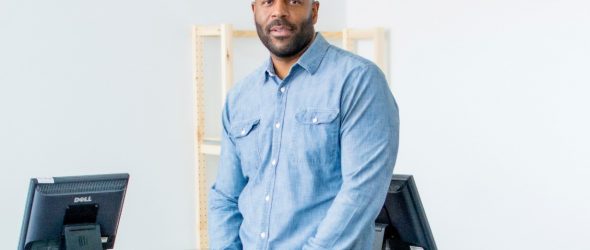
A few months before Massachusetts voters passed a ballot initiative legalizing recreational marijuana, Pure Oasis founders Kobie Evans and Kevin Hart began toying with the idea of opening Boston’s first cannabis dispensary.
Evans, who has a background in real estate, had been following the campaign to legalize recreational marijuana in the Commonwealth in the months leading up to the November 8, 2016 election. When the measure passed, Evans and Hart began more seriously planning to get into the cannabis industry.
Over the next year or so, the two entrepreneurs began sketching out a plan, raising money from friends and family, scouting possible locations, and working to understand the complex nuances of Massachusetts’ long dispensary licensing process.
The pair applied for the state’s Economic Empowerment Program in 2018, two years after Bay State voters decided to legalize recreational cannabis. At the time, the first adult-use cannabis shops in the Commonwealth were just beginning to open.
Midway through 2019, the Cannabis Control Commission (CCC) granted Pure Oasis its provisional retail license and the dispensary finally opened its doors on March 9, 2020.
It was a historic moment, as Boston became the first major East Coast city to permit the opening of an adult-use cannabis dispensary. Pure Oasis was also the first black-owned cannabis dispensary to open in Massachusetts.
“Boston has a storied history of segregation and racism, and there is a very real economic inequality in the city,” Evans told THCnet. “People of color are generally marginalized and live in situations where they are at risk. We hope to be a beacon of hope, and we want to live up to that.”
However, the lights on that beacon dimmed when the coronavirus pandemic hit, forcing thousands of Massachusetts business owners to temporarily shutter after Governor Charlie Baker issued an emergency order requiring all “non-essential” businesses, including recreational pot shops, to close.
After years of planning and preparation, Pure Oasis was suddenly forced to furlough over 30 employees just two weeks into operations.
“It was a tough pill to swallow,” said Evans. “But at the same time, there was a global pandemic. We took a lot of solace in the fact that our staff was safe, and that they weren’t on the front lines being exposed.”
Over the next two months, Evans and Hart eagerly awaited the moment when they’d be allowed to reopen.
During that time, a group of Massachusetts cannabis companies and consumers unsuccessfully sued Gov. Baker, claiming that his decision to close the recreational shops was illegal.
Pure Oasis was not involved in the lawsuit, but Evans nonetheless sympathized with those who challenged Baker’s order.
“A lot of people got hit hard,” he said. “We all suffered. For everyone involved, it was a challenging time and it is still a challenging time.”
On Monday, Pure Oasis and other recreational shops throughout Massachusetts were allowed to resume operations, though they were limited to remote fulfilment and curbside pickup orders only.
Asked how much demand recreational shops should anticipate, Evans said accurate forecasting would be one of the more difficult parts of the reopening process.
“It’s hard to predict how many people in Boston are going to come to Pure Oasis, and how much staff we will need,” he said, noting that he would likely bring more employees back from the onset in an effort to better control the flow of customers arriving to pick up curbside orders.
To help facilitate digital contactless payment, Pure Oasis began working with Hypur, which provides banking solutions to cannabis companies, and Dutchie, which sells online ordering software to dispensaries.
Evans added that he is planning to apply for a new cannabis delivery license, which will only be available to Economic Empowerment applicants (like Pure Oasis) and Social Equity Program participants for a period of two years.
Meanwhile, the company is also preparing to open two additional locations — in Medford, Mass., and in the Mattapan neighborhood of Boston. According to Evans, Pure Oasis has been paying rent in those spots for over a year while it works its way through a long and slow licensing process.


